

Baconian theory of Shakespeare authorship. The Baconian theory of Shakespeare authorship holds that Sir Francis Bacon, philosopher, essayist and scientist, wrote the plays which were publicly attributed to William Shakespeare.
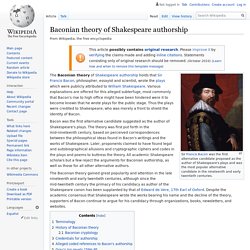
Various explanations are offered for this alleged subterfuge, most commonly that Bacon's rise to high office might have been hindered were it to become known that he wrote plays for the public stage. Oak Island, Nova Scotia - Popular Theories. Tar KilnCertainly given Oak Island's long history it is not impossible that a tar kiln was established by the British for the production of this substance.
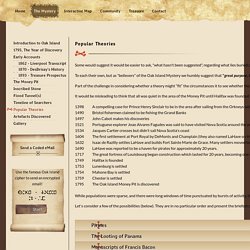
However, the size and nature of a tar kiln is far and removed from the scope and scale of the Oak Island workings. Dry DockThis theory concludes that the Money Pit was not a location of buried treasure, but instead a pumping station for a pirate drydock, making Oak Island one of the first shipyards in North America. The works discovered on Oak Island, from the tunnels to the shafts, resemble known dry-docks found in the West Indies. Although there is no proof of a windmill structure or remnants on the island, the theory was well considered and drawn by its proponent. As pirates were headquartered in the nearby mouth of the LaHave river during the 1690s and beyond, Oak Island made for a sheltered and feasible option for a shipyard.
The Wisdom of Shakespeare. “There are more things in heaven and earth, Horatio, than are dreamt of in your philosophy.”
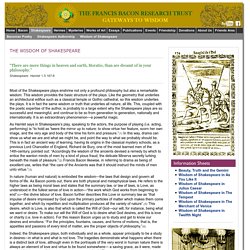
Shakespeare: Hamlet 1.5.167-8 Most of the Shakespeare plays enshrine not only a profound philosophy but also a remarkable wisdom. This wisdom provides the basic structure of the plays. Like the geometry that underlies an architectural edifice such as a classical temple or Gothic cathedral, so this wisdom underlies the plays. It is in fact the same wisdom or truth that underlies all nature, all life. As Hamlet says in Shakespeare’s play, speaking to the actors, the purpose of playing (i.e. acting, performing) is “to hold as 'twere the mirror up to nature: to show virtue her feature, scorn her own image, and the very age and body of the time his form and pressure.”(1) In this way, drama can show us what we are and what we might be, and point the way to what we probably should be.
Baconian Poetry: masques, plays and entertainments by Francis Bacon. “A man so rare in knowledge, of so many several kinds endued with the facility and felicity of expressing it in all so elegant, significant, so abundant, and yet so choice and ravishing a way of words, of metaphors and allusions as, perhaps, the world hath not seen, since it was a world.”
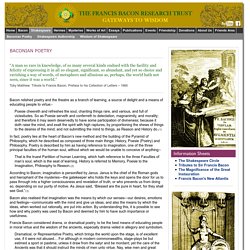
Toby Matthew: Tribute to Francis Bacon, Preface to his Collection of Letters – 1660 Bacon relished poetry and the theatre as a branch of learning, a source of delight and a means of educating people to virtue:- Poesie cheereth and refreshes the soul, chanting things rare, and various, and full of vicissitudes. So as Poesie serveth and conferreth to delectation, magnanimity, and morality; and therefore it may seem deservedly to have some participation of divineness; because it doth raise the mind, and exalt the spirit with high raptures, by proportioning the shews of things to the desires of the mind; and not submitting the mind to things, as Reason and History do.(1) Shakespeare: the Gemini Spear-shakers and their good pens. “He, who hath filled up all numbers and performed that in our tongue which may be compared, or preferred, either to insolent Greece or haughty Rome… So that he may be named, and stand as the mark and acme of our language.”
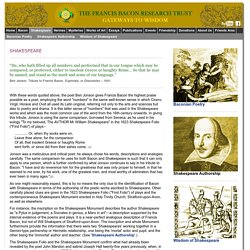
Ben Jonson: Tribute to Francis Bacon, Explorata, or Discoveries – 1641 With these words quoted above, the poet Ben Jonson gives Francis Bacon the highest praise possible as a poet, employing the word "numbers" in the same well-known sense in which Cicero, Virgil, Horace and Ovid all used its Latin original, referring not only to the arts and sciences but also to poetry and drama. It is this latter sense of "numbers" that was used in the Shakespeare works and which was the most common use of the word from the 16th-century onwards. In giving this tribute, Jonson is using the same comparison, borrowed from Seneca, as he used in his eulogy "To my beloved, The AVTHOR Mr William Shakespeare" in the 1623 Shakespeare Folio ("First Folio") of plays:- ............. 1. Tributes to Sir Francis Bacon: an Apollo and secret poet. “Praise is not confined to the qualities of his intellect, but applies as well to those which are matters of the heart, the will and moral virtue… having all the thoughts of that large heart of his set upon adorning the age in which he lives, and benefiting, as far as possible, the whole human race.”
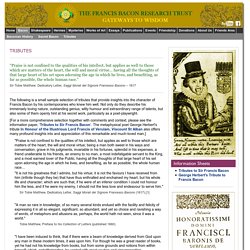
Sir Tobie Matthew: Dedicatory Letter, Saggi Morali del Signore Francesco Bacono – 1617. Introduction. What Was The Church Trying To Hide? By Tony Bushby What was the church trying to hide?
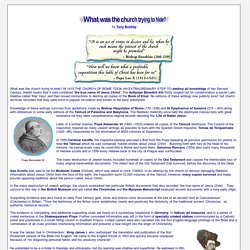
IN 1415,THE CHURCH OF ROME TOOK AN EXTRAORDINARY STEP TO destroy all knowledge of two Second Century Jewish books that it said contained ‘the true name of Jesus Christ.’ The Antipope Benedict XIII firstly singled out for condemnation a secret Latin treatise called ‘Mar Yesu’ and then issued instructions to destroy all copies of the Book of Elxai. No editions of these writings now publicly exist, but church archives recorded that they were once in popular circulation and known to the early presbyters. Knowledge of these writings survived from quotations made by Bishop Hippolytus of Rome (176 –236) and St Epiphanius of Salamis (315 – 403) along with references in some early editions of the Talmud of Palestine and Babylonia.
Later, in a similar manner, Pope Alexander VI (1492 –1503) ordered all copies of the Talmud destroyed. Sea Scrolls was said to be the Bodleian Codex (Oxford), which was dated to circa 1100AD. What Was The Church Trying To Hide? Bacon Bible - How a Templar re-wrote the Bible, page 1. Yes, you read correctly.
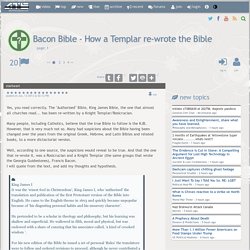
The "Authorised" Bible, King James Bible, the one that almost all churches read... has been re-written by a Knight Templar/Rosicrucian. Many people, including Catholics, believe that the true Bible to follow is the KJB. However, that is very much not so. Many had suspicions about the Bible having been changed over the years from the original Greek, Hebrew, and Latin Bibles and related books, to a more dictactorial version. Well, according to one source, the suspicions would reveal to be true. Bacon Bible - How a Templar re-wrote the Bible, page 1. THE NEW ATLANTIS: Master Plan Of The Ages. Cosmic Convergence Research Group The Hidden Connections between the Elizabethan Court led by Sir Francis Bacon, the Founding Fathers of the American Republic guided by Comte de Saint Germain, and the Kremlin Leaders Assembled by Russian President Vladimir Putin This is a story which spans the entirety of the 6000 yearlong Kali Yuga.
Also known as the Age of Quarrel, which began with the Mayan Long Count Calendar in approximately 3113 B.C.E., the Kali Yuga is analogous to the present Iron Age. Bacon Bible - How a Templar re-wrote the Bible, page 1. “L’immortel Chancelier d’Angleterre” : Francis Bacon, Memory and Method. Texte intégral 1 “Commentary on On Memory and Recollection,” in St.
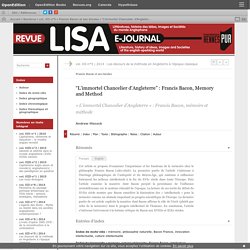
Thomas Aquinas, Commentaries on Aristotle’s On S (...) “The role of prudence is to direct the prudent man to do what ought to be done by considering not only the present but also the past. This is why Cicero sets down as the parts of prudence not only foresight, through which future things are attended to, but also understanding, through which present things are considered, and memory, through which past things are apprehended. [...] there can be a science about future contingents inasmuch as some sciences know that there may be inclinations to such-and-such effects. In this sense, there is a natural science dealing with things subject to generation and corruption.
The Philosophy of Francis Bacon. Francis Bacon Research Trust. Bacon Bible - How a Templar re-wrote the Bible, page 1. Bacon, Shakespeare, and the Roscrucians. Index Previous Next p. 165 THE present consideration of the Bacon--Shakspere--Rosicrucian controversy is undertaken not for the vain purpose of digging up dead men's bones but rather in the hope that a critical analysis will aid in the rediscovery of that knowledge lost to the world since the oracles were silenced.
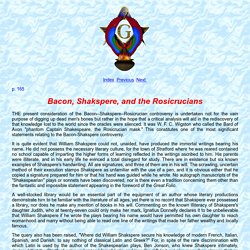
It was W. F. C. Francis Bacon Research Trust. “Praise is not confined to the qualities of his intellect, but applies as well to those which are matters of the heart, the will and moral virtue… having all the thoughts of that large heart of his set upon adorning the age in which he lives, and benefiting, as far as possible, the whole human race.” Sir Tobie Matthew: Dedicatory Letter, Saggi Morali del Signore Francesco Bacono – 1617 The following is a small sample selection of tributes that provide insights into the character of Francis Bacon by his contemporaries who knew him well. Not only do they describe his immensely loving nature, outstanding genius, witty humour and extraordinary range of talents, but also some of them openly hint at his secret work, particularly as a poet-playwright.
For a more comprehensive selection together with comments and context, please see the information paper, ‘Tributes to Sir Francis Bacon’. Sir Tobie Matthew, Dedicatory Letter, Saggi Morali del Signore Francesco Bacono (1617).[1] R. 1. Francis Bacon Research Trust. “Next unto God, Love is the Cause of Causes, itself without any Cause.” Francis Bacon: Cupid and Coelum, On Principles and Origins As a philosopher, Francis Bacon was likened to three famous "ancient" philosophers, Hermes, Plato and Solomon.He also referred to himself as the “herald of a new time”—a time of paradise on earth, ushered in by the “last ages” when “the thorough passage of the world and the advancement of the sciences are destined by fate, that is, by Divine Providence, to meet in the same age”.(1) In this statement Bacon seems to deliberately associate himself with Elias the Artist whom Paracelsus prophesied would appear to the world at the time of the celestial events of 1602-4 and usher in an era of enlightenment.
These associations act as gateways to a better understanding of Bacon and his philosophy. Bacon Bible - How a Templar re-wrote the Bible, page 1. Sir Francis Bacon, who was William Tudor, who was William Shakespeare. Shakespeare Creator of Freemasonry. Is the title of an incredible book by Alfred Dodd that reveals incontestably proof that the Great Shakespeare Folio of 1623 are saturated in Masonry, and that William Shakespeare was not only a Freemason, but no less than the founder of the Fraternity himself! The book is a straightforward compilation of specific statements from the pen of the Author of the Shakespeare Plays, that constitute to definite evidence that Modern Freemasonry was known to him and that he employed Masonic imagery and symbolism in his Works. Circumstantial evidence is brought to show that he must have sat in many a Speculative Lodge and participated in its Rites.
Many naive Freemasons believe that Freemasonry with its 'Three Degrees' was created by Freemasons Dr James Anderson and Desaguliers form the Rite of the One Degree from 1717 -23-38. It said; "The 1717-Theory" is no longer tenable in view of the evidence that the Elizabethan Brethren "moralised on Tools and spiritualised Temples" in 1589. Dr. Hiram Abiff. What's in a Name. The Missing Head of Bacon. Francis Bacon Research Trust. “I have held up a light in the obscurity of Philosophy, which will be seen centuries after I am dead. It will be seen amidst the erection of tombs, theatres, foundations, temples, of orders and fraternities for nobility and obedience.” Francis Bacon: Advancement of Learning, Bk II – 1605 Francis Bacon’s statement quoted above should be taken seriously. First of all he says that the light that he has held up will be seen centuries after he is dead (he died in 1626), which suggests two things: either that it will be seen for many centuries, or that it won’t be seen until after many centuries are past.
(Bacon is a master of ambiguity.) Francis Bacon Research Trust. “In short, all that were great and good loved and honoured him.” John Aubrey, Brief Lives – 1680-93. Tributes to Sir Francis Bacon. Francis Bacon - Scientist, Lawyer. Home. Six Degrees of Francis Bacon. Sir Francis Bacon's New Advancement of Learning Bacon is Shakespeare : Discover England's Theatre Genius. A rose by any other name....would be known to Shakespeare. Sir Francis Bacon. Here's a helpful map of Francis Bacon's social network. Sir Francis Bacon. Baconian Evidence for Shakespeare Authorship. Sir Francis Bacon Meets The New Advancement of Learning. Sir Francis Bacon Meets The New Advancement of Learning. Quest of the Ages - Sir Francis Bacon. "I have held up a light in the obscurity of Philosophy, which will be seen centuries after I am dead.
It will be seen amidst the erection of Tombs, Theatres, Foundations, Temples, Orders and Fraternities for nobility and obedience — the establishment of good laws as an example to the World. For I am not raising a Capitol or Pyramid to the Pride of men, but laying a foundation in the human understanding for a holy Temple after he model of the World. For my memory I leave it to Men's charitable speeches, to foreign Nations and the next Ages, and to my own Country after some Time has elapsed.
" -- Francis Bacon, Advancement of Learning (1605), Bk II. Bacon Shaker. Socpol.uvvg.ro/docs/2013-1/2. Sebastian Mateiescu.pdf. Occult theories about Francis Bacon. Secret societies[edit] Francis Bacon often gathered with the men at Gray's Inn to discuss politics and philosophy, and to try out various theatrical scenes that he admitted writing.[1] Bacon's alleged connection to the Rosicrucians and the Freemasons has been widely discussed by authors and scholars in many books.[2] However others, including Daphne du Maurier (in her biography of Bacon), have argued there is no substantive evidence to support claims of involvement with the Rosicrucians.[3] Historian Dame Frances Yates[4] does not make the claim that Bacon was a Rosicrucian, but presents evidence that he was nevertheless involved in some of the more closed intellectual movements of his day.
The Essays by Francis Bacon. What is truth? Ambac 2b. Francis Bacon. Did Sir Francis Bacon edit the King James Bible? Sir Francis Bacon, who was William Tudor, who was William Shakespeare. Knightmp. Francis Bacon - News, Updates, Images & Quotes. The Essays Or Counsels, Civil and Moral, by Francis Bacon. Bacon-Shakespeare. Baconian theory of Shakespeare authorship. Stars Over Washington: Francis Bacon, Uranus/Neptune, and Pluto.
Occult theories about Francis Bacon. Francis Bacon Society. Facsimile & Type Transcript of an Elizabethan Manuscript Preserved at Alnwick Francis Bacon. Sir Francis Bacon, the Count of St. Germain, the Supernova of 1604 and the 800 Year Spiritual Cycle. American Bacon Society Ben Jonson quote files. Francis Bacon And Shakespeare Authorship Controversy. Pardon Francis Bacon Petition. Sir Francis Bacon's New Advancement of Learning Bacon is Shakespeare : Discover England's Theatre Genius.